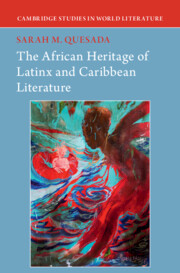Book contents
- The African Heritage of Latinx and Caribbean Literature
- Cambridge Studies in World Literature
- The African Heritage of Latinx and Caribbean Literature
- Copyright page
- Contents
- Illustrations
- Acknowledgments
- Introduction Textual Memorials of a Latin-African Literature
- Chapter 1 Fear
- Chapter 2 Commodification
- Chapter 3 Obliteration
- Chapter 4 Archival Distortion
- Coda
- Notes
- Bibliography
- Index
Chapter 1 - Fear
Junot Díaz’s Zombies and Les contorsions extraordinaires in “Monstro”
Published online by Cambridge University Press: 14 July 2022
- The African Heritage of Latinx and Caribbean Literature
- Cambridge Studies in World Literature
- The African Heritage of Latinx and Caribbean Literature
- Copyright page
- Contents
- Illustrations
- Acknowledgments
- Introduction Textual Memorials of a Latin-African Literature
- Chapter 1 Fear
- Chapter 2 Commodification
- Chapter 3 Obliteration
- Chapter 4 Archival Distortion
- Coda
- Notes
- Bibliography
- Index
Summary
This chapter traces the history of the zombie back to its Vodun cradle of Dahomey (the Republic of Benin) in Díaz’s sci-fi eco-parable “Monstro” (New Yorker 2012). A story about an epidemic that spreads on the Haitian-Dominican borderland and gives birth to a racialized zombie, I read the discourse of difference in Díaz’s story through the lens of the African archive. The French 1763 Relation du Royaume de Judas en Guinée, (in les Archives Nationales d’outre mer, Aix-en-Provence, France) and oral proverbs preserved at memorial sites in Ouidah, Benin recovered during fieldwork shed light on the ways the zombie became distorted, in Africa, before becoming a symbol of fear in the American imaginary. Ultimately, I argue that if the zombie became distorted when written into the colonial archive, reading Díaz’s story alongside African archival epistemologies—both oral and written—rewrites a Latin-African history. By revisiting African archives about Vodun, along with White colonial fears of slave rebellion in the Americas and neoliberal labor exploitation, I show how Díaz’s story mimics the archival discourse about Vodun and its practice to redraw a Latinx-African axis and unsettle the common conception of the zombie to deroot its eurocentric signification.
- Type
- Chapter
- Information
- The African Heritage of Latinx and Caribbean Literature , pp. 33 - 75Publisher: Cambridge University PressPrint publication year: 2022

